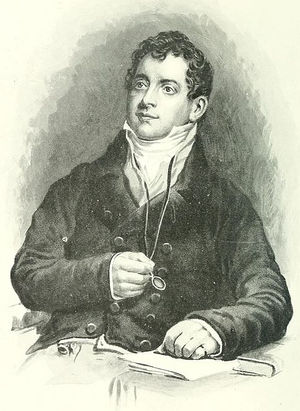Thomas Moore/ru: Difference between revisions
PeterDuffy (talk | contribs) (Created page with "Томас Мур, ирландский поэт") |
PeterDuffy (talk | contribs) (Created page with "Томас Мур родился в Дублине в 1779 году. Плодовитый прозаик и поэт, он одарил землю Ирландии своей...") |
||
| Line 4: | Line 4: | ||
'''Thomas Moore''' was an embodiment of the ascended master [[El Morya]]. | '''Thomas Moore''' was an embodiment of the ascended master [[El Morya]]. | ||
Томас Мур родился в Дублине в 1779 году. Плодовитый прозаик и поэт, он одарил землю Ирландии своей нежной любовью к Богу и человеку. В 1799 году он окончил Тринити Колледж и отправился в Лондон. Казнь близких университетских друзей во время восстания "Объединенных ирландцев" пробудила в Муре, впечатлительном молодом человеке "с живым ирландским темпераментом", патриотический пыл, давший ему величайшее литературное вдохновение. Прямота его стиля и юношеский задор сделали его полезным британскому либеральному движению в качестве остроумного сатирика; его поэмы служили политической карикатурой того времени, вызывавшей острую полемику. | |||
Thomas Moore’s greatest works included a brilliant biographical masterpiece taken from the confidential memoirs of Lord Byron. His own ''Memoirs'', ''Journal'', and ''Correspondence'' are an invaluable social record of life in England and Ireland during the first half of the nineteenth century. | Thomas Moore’s greatest works included a brilliant biographical masterpiece taken from the confidential memoirs of Lord Byron. His own ''Memoirs'', ''Journal'', and ''Correspondence'' are an invaluable social record of life in England and Ireland during the first half of the nineteenth century. | ||
Revision as of 20:15, 3 January 2023

Thomas Moore was an embodiment of the ascended master El Morya.
Томас Мур родился в Дублине в 1779 году. Плодовитый прозаик и поэт, он одарил землю Ирландии своей нежной любовью к Богу и человеку. В 1799 году он окончил Тринити Колледж и отправился в Лондон. Казнь близких университетских друзей во время восстания "Объединенных ирландцев" пробудила в Муре, впечатлительном молодом человеке "с живым ирландским темпераментом", патриотический пыл, давший ему величайшее литературное вдохновение. Прямота его стиля и юношеский задор сделали его полезным британскому либеральному движению в качестве остроумного сатирика; его поэмы служили политической карикатурой того времени, вызывавшей острую полемику.
Thomas Moore’s greatest works included a brilliant biographical masterpiece taken from the confidential memoirs of Lord Byron. His own Memoirs, Journal, and Correspondence are an invaluable social record of life in England and Ireland during the first half of the nineteenth century.
Although he spent most of his life in England, Moore became known and loved as the national lyricist of Ireland through his Irish Melodies—a collection of verses written to the tunes of old Irish folk songs. The best remembered of these romantic ballads is “Believe Me, If All Those Endearing Young Charms,” which to the present day draws the power of his intense love for the will of God.
- Believe me, if all those endearing young charms,
- Which I gaze on so fondly to-day,
- Were to change by to-morrow, and fleet in my arms,
- Like fairy-gifts, fading away,—
- Thou wouldst still be ador’d as this moment thou art,
- Let thy loveliness fade as it will;
- And around the dear ruin each wish of my heart
- Would entwine itself verdantly still!
- It is not while beauty and youth are thine own,
- And thy cheeks unprofan’d by a tear,
- That the fervour and faith of a soul can be known,
- To which time will but make thee more dear!
- No, the heart that has truly lov’d never forgets,
- But as truly loves on to the close,
- As the sun-flower turns on her god, when he sets,
- The same look which she turn’d when he rose.
Sources
El Morya, The Chela and the Path: Keys to Soul Mastery in the Aquarian Age.
